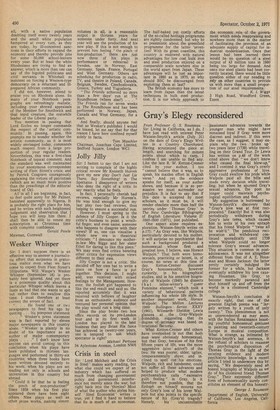Gray's Elegy reconsidered
From Professor G. S. Rousseau Sir: Living in California, as I do, I have just read with interest Peter Watson-Smyth's article (July 31) on the date of Gray's Elegy Writ ten in a Country Churchyard. Having scrutinized the piece at length, and searching for minute points about which to carp, I confess I am unable to find any. Like the late R. W. Ketton-Cremer cited by your author, I too "cannot believe that it was, so to speak, his maiden effort in English verse." And yet the evidence speaks for itself, as your author shows, and because it is so persuasive we must surrender our prejudice. It is fair to say that if this date is accepted by most scholars, as it must be, it will render obsolete more than half the untries under 'Thomas Gray' in The New Cambridge Bibliography of English Literature: Volume II: 1660-1800 (1971), just published.
One aspect alone requires exploration. Watson-Smyth writes on p.171: "As Gray was, like Walpole, particularly devoted to his mother, it will surprise no psychiatrist that such a background produced a homosexual whose first and greatest love, I believe, was Horace Walpole." That both were homo sexuals, practicing or latent, is, of course, no news at this time of day. Ketton-Crerner discusses Gray's homosexuality, however cursorily, in his biographical studies, and in his sensitive biogra phy of Walpole (1940) he dissects that letter-writer's " queer Feminine element," which took a variety of behavioural patterns influencing his whole life style. In another important work, Horace Walpole: The Mellon Lectures 1960: Bollingen Series XXXV (1961), Wilmarth Sheldon Lewis glances at the Gray-Walpole friendship, suggesting that its degree of intimacy was based on irrational factors.
What Ketton-Cremer and others have overlooked is not that both men were obviously homosexual, but that Gray, because of his first fifteen years of life, was the more aggressive (also active?) of the two. He was poorer, older, uglier, temperamentally shyer, and inclined to spell out his emotions.
Walpole, rich and handsome, could not suffer all these advances and helped to produce what modern psychoanalysis calls "excessive guilt feeling " in Gray. Is it therefore not possible, that the Epitaph on himself mourns not only Gray's loss of his lover Walpole but also points to the specific nature of his (Gray's) tragedy? Namely, his uncontrollable passionate advances towards the younger man who might have remained loyal if Gray were more discreet and indirect. If this were the case, as I suggest, it may ex plain why the two 'broke up' two years later (1739) while travelling on their Grand Tour. Dr Lewis has written on p.48 of the work cited above that "we don't know what caused the final blow-up," and I contend it was Gray's overly aggressive professions of love. Gray could swallow his pride while Walpole paid all the bills and made every decision while travelling; but when he spurned Gray's sexual advances, the poet no longer could maintain psychological equilibrium and fled. My suggestion is buttressed by Watson-Smyth's discovery that "Gray's love was at first reciprocated." Exactly! But it was also periodically withdrawn during Gray's late teens, which caused him to write in his own epitaph that his friend Walpole " 'twas all he wish'd." The pendulous reciprocation and withdrawal continued sporadically until 1739 when Walpole could no longer tolerate Gray's sexual advances. This situation is common in postadolescence. It was not altogether different from that of A. E. Housman and Moses Jackson: the latter pretty certainly indulged the former for a while, but Jackson eventually withdrew his love causing Housman, like Gray, to become markedly paranoid and shut himself up and off from the world in a cloistered Cambridge college.
Watson-Smyth's conclusion is exactly right, that one of the greatest English poems was "largely written by a youth of only twenty." This phenomenon is not so unprecedented as may seem, with the Italian Renaissance boasting youthful homosexual geniuses in painting and twentieth-century Europe in musical composition. What is strange, as intimated by Watson-Smyth's last sentence, is the refusal of scholars to reassess the psychological disposition of Thomas Gray in the light of the existing evidence and modern psychiatric knowledge. In a recent article I tried to underscore this bY saying, "We desperately need all honest biography of Walpole as we do of his cloistered friend Thomas Gray." Their extremely different form of homosexuality surely constitutes an element of this honesty.
George J. Rousseati Department of English, University of California, Los Angeles, California
































 Previous page
Previous page